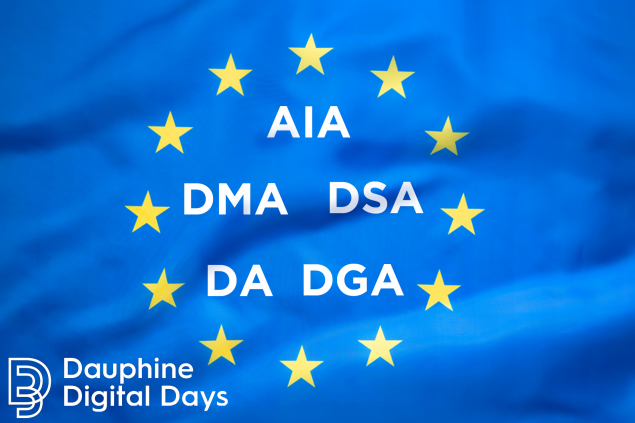
|
| , - |
|
| Raymond Aron room, Paris Dauphine-PSL University |
Opening conference of the Dauphine Digital Days 2024
The EU has enacted an extensive body of digital legislations, mostly under the Digital Agenda and the Digital Single Market (DSM) initiatives of the von der Leyen Commission : i.e. the Digital Markets Act (DMA), the Digital Services Act (DSA), the Data Act, the Artificial Intelligence Act (AI Act), the Data Governance Act (DGA), the European Health Data Space (EHDS), an update to the regulation on electronic identification and trust services (eIDAS 2) and a measure to strengthen the cybersecurity of critical infrastructure (NIS2). Together with the General Data Protection Regulation (GDPR) enacted during the previous legislature, these initiatives have made of the EU the jurisdiction with the most comprehensive digital regulatory framework, framing not only the activity of technology manufacturers and digital services providers, but also that of the users whether they are large or small corporations, NGOs or public administrations. This has been triggering a set of fierce debates both about the substance of each of these legislations and about the expected outcomes for the EU in terms of innovation, competitiveness, welfare of citizens, protection of democratic values, etc.
An overlooked aspect of this far-reaching regulatory policy has so far been its implementation. As in other fields (Green deal, etc.), different stakeholders have called for a pause on the legislative front to allow the EU to focus on effective enforcement. One of the key characteristics of all these legislations is that they are ‘EU Regulation,’ directly applicable in all Member States (by contrast with EU Directives), which allows for harmonization on the substantive side of policy but does not always set in stones the concrete allocation of regulatory powers national level. Indeed, Member States choose the National Regulatory Agency (NRA) which will be in charge of implementing each of these regulations. In practice, each EU member state can decide to establish a specialized entity or ask a set of pre-existing agencies to implement the various components of these regulations; with a request to coordinate the work of those agencies within and across national borders. The NRAs in charge of the various sub-sets of the European digital regulatory corpus are thus requested to cooperate horizontally, even though they might be granted with different mandates and status in each country. Even for the DMA, where a ‘division of labor’ between the DG Comp of the EU Commission and the national antitrust authorities is instituted, the frontier of DMA and antitrust enforcement is already a source of debate and will have to be fine-tuned in view of concrete experience.
While this choice of a distributed implementation of a common legislation might be explained by the EU context, difficulties of Member States to relinquish sovereignty or a form of path dependency in the allocation of regulatory powers, the resulting governance arrangement might be questioned. Indeed, alternative choices could have been considered, such as the creation at the national level of a dedicated Digital Regulation Authority and/or the establishment at the European level of a (or a set of) specialized agency(ies).
The aim of this conference was to take stock of the existing landscape, with its intrinsic risks and limits, and discussed whether a more integrated, at least coordinated, system of regulatory governance could be established. In the context of this debate, the short-term issues of transaction costs and consistency, and their impact in terms of compliance, was considered. But we was also focus on the long-term perspective of adaptation and development of capabilities which are crucial for the sustainability of a regulatory framework.
Programm:
14h - Mots d'ouverture des Dauphine Digital Days
- E.M. Mouhoud, Président de l’Université Paris Dauphine – PSL
- Isabelle Ryl, Vice-Présidente IA et directrice de l'Institut PRAIRIE (PaRis Artificial Intelligence Research InstitutE), Université PSL
14h15-15h30 - The Implementation Challenges
Chair: Joelle Toledano | Professor of Economics, Governance & Regulation Chair
- Andreas SCHWAB | Member of the European Parliament
- Jens PRÜFER | Director, Tilburg Law and Economics Center ; Professor in Economics, School of Economics, University of East Anglia ; Deputy Director, Centre for Competition Policy ; Principal Investigator, Horizon Europe project AI4POL ; Member, Expert group to the EU Observatory on the Online Platform Economy
- Rishabh KAUSHAL | Postdoc at Institute of Data Science (IDS) in Department of Advanced Computer Science (DACS) at Maastricht University, Netherlands ; Assistant Professor at Department of Information Technology, Indira Gandhi Delhi Technical University for Women
- Thomas COURBE | Directeur Général, Direction Générale des Entreprises, Ministère de l’Economie, des Finances et de l’Industrie
15h30-16h45 - Implementation in practice
Chair: Chiara Caccinelli | Deputy Head of the Economic Analysis and Digital Intelligence Unit, Arcep & Co-Chair of the Digital Markets Group, BEREC
- Antoine BABINET | Deputy Head of Unit in Digital Platform directorate of DG Competition; European Commission
- Gabriele CAROVANO | Case handler - Italian Competition Authority - Digital platforms and communications Unit - Consumer Protection Directorate
- Guillaume DUQUESNE | Senior Vice President Compass Lexecon
- Oles ANDRIYCHUK | University of Exeter School of Law ; Digital Markets Research Hub YouTube weekly discussions
Coffee Break
17h15-18h30 - Harmonization or Big Bang ?
Chair: Eric Brousseau| Professor of Economics, Governance & Regulation Chair
- Irene ROCHE LAGUNA | Head of Unit “Coordination and Regulatory compliance”, DG CONNECT, European Commission
- Alexandre LACRESSE | Cours de Justice de l’Union Européenne
- Alexandre DE STREEL | CERRE & Université de Namur
- Jean-Yves OLLIER | Conseiller d'État

























